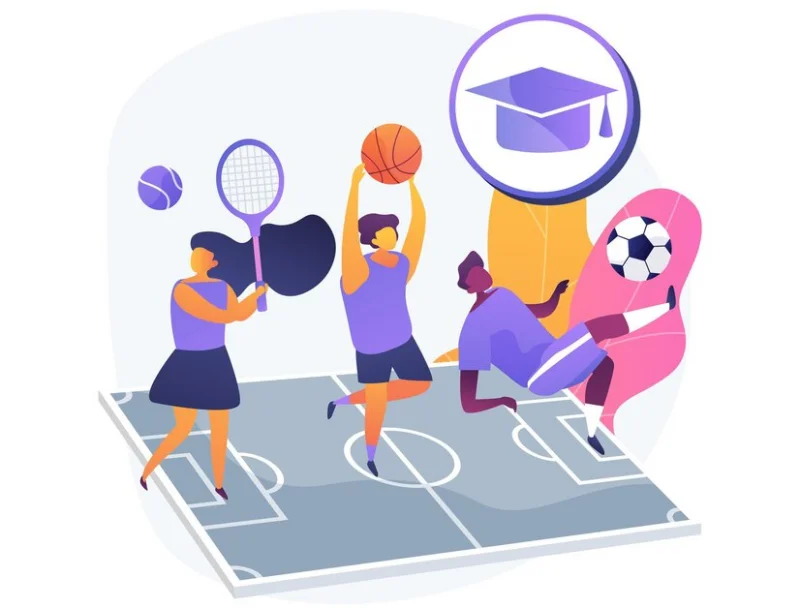How Sports Are Being Used to Promote Education in Developing Countries
Even the soccer pitch wasn’t level: half was dry dirt, and the other scrappy grass, but every afternoon in Western Kenya, children sprint toward it as though it were a grand stadium. They are not simply running after the ball but following a command: during the week, school must be attended to play on the weekend. In many developing countries, sports do not only constitute an activity that one does to exercise; they keep children engaged in school.
School Attendance Incentives Through Sports
In Cameroon, the sun scorches Garoua—local football coaches essentially double as school monitors. If a child skips class, there are consequences: they are removed from the team. It’s harsh, but highly effective. Even platforms like online betting sites are paying attention to how sports can impact communities beyond the field. Coaches maintain contact with schools. Locals support the initiative. And the students? They do their school work because they know that kickoff on Saturday depends on it.
It has become commonplace. In Lucknow, India, cricket clubs take attendance. In Bolivia, entire volleyball leagues check children’s homework. The mere possibility of scoring a goal or earning a medal is enough for children to stay in classrooms. School is no longer seen as an obstacle, but rather a critical juncture on the journey to something greater. Attendance improves for teachers, and purpose is found for kids.

Scholarships for Young Athletes
Having raw talent is like getting a gift and a ticket for something. In many places where school is expensive, sports scholarships are a game-changer. Children talented in running, playing any sport, or shooting have an excellent opportunity for further education.
Take note of how sports can educate you:
- Nigeria: Talented football players can train at the Pepsi Football Academy, which includes free schooling.
- India: Rural players are supported by Khelo India, which covers their educational and other sporting expenses.
- Ghana: Students have full scholarships abroad through the Right to Dream Academy.
- Uganda: Women in Track and Field have sponsorships to encourage them to stay in school instead of promoting early marriages.
Being a top performer is insufficient in these programs, as they require much more. Class attendance, which must be honest, genuine, and concentrated, is essential. This is truly an opportunity for these children and the only chance they will get their education.
How Sports Programs Support Life Skills and Literacy
In other parts of developing countries, coaches teach reading, decision-making, and even teamwork in the very fields where kids learn to dribble a ball or sprint. Some of these programs even get inspiration from platforms like Melbet, where strategy and focus matter just as much as in the classroom. The ball becomes a deviation and also a tool for lessons that stick.
Teaching Literacy Through Game-Based Learning
In northern Uganda, there is a refugee camp where 9-year-olds gather around a chalkboard before football practice. Their coach writes “run” or “pass” and asks them to spell them out while kicking the ball. It’s sweaty, it’s loud, and somehow—it works. They learn faster that way.
In Nepal, Netball drill sessions start with clapping games and number rhymes. Kids don’t just sit still and learn math and words. There isn’t a desk or rows, just rhythm, motion, and memory. When there are no classrooms, creativity flourishes, and children learn better when they are in motion.
Developing Leadership and Communication
In Senegal’s football camps, team talks in between games aren’t about wins. It’s more focused on who spoke nicely, who didn’t lose their cool, and how people treated one another. Young captains lead these. This is where they learn to lead, not just play.
Girls run cricket sessions in rural Pakistan, organizing the teams, calling out plays, and solving the issues that arise. For many, having that level of power is groundbreaking. In addition to learning to lead, they know that their voice matters. It’s loud, it’s on the field, and it’s real.

Partnerships with NGOs and Governments
Zambia is a rural location in Africa. Each child got the chance to practice with an old soccer ball. FIFA provided the equipment, and UNICEF donated the jerseys. Local teachers worked with NGOs and received training to become coaches. The sponsorship for all of these came as a government grant. It is easy to see how this might serve as the foundation for development; efforts off the field also matter.
Other organizations, such as Save the Children and Right to Play, facilitate expansive global change. These nongovernmental organizations assist in including sports like basketball into the school curriculum by interacting with the government and training coaches. This form of support transforms fantasy miniature games in dusty terrains into perspective tools for a bright tomorrow.
Challenges and Future Outlook
The cheaper alternative is to remove baseball fields and replace them with soccer fields. A younger generation is being molded into leaders. This is primarily possible due to a supportive community around them, so when these youngsters are given a chance, a ball, and a voice, a baton of sponsorship is all that is needed.
Ti potrebbe interessare:
Segui guruhitech su:
- Google News: bit.ly/gurugooglenews
- Telegram: t.me/guruhitech
- X (Twitter): x.com/guruhitech1
- Bluesky: bsky.app/profile/guruhitech.bsky.social
- GETTR: gettr.com/user/guruhitech
- Rumble: rumble.com/user/guruhitech
- VKontakte: vk.com/guruhitech
- MeWe: mewe.com/i/guruhitech
- Skype: live:.cid.d4cf3836b772da8a
- WhatsApp: bit.ly/whatsappguruhitech
Esprimi il tuo parere!
Che ne pensi di questa notizia? Lascia un commento nell’apposita sezione che trovi più in basso e se ti va, iscriviti alla newsletter.
Per qualsiasi domanda, informazione o assistenza nel mondo della tecnologia, puoi inviare una email all’indirizzo [email protected].
Scopri di più da GuruHiTech
Abbonati per ricevere gli ultimi articoli inviati alla tua e-mail.
